|
|
|
Sort Order |
|
|
|
Items / Page
|
|
|
|
|
|
|
| Srl | Item |
| 1 |
ID:
124738
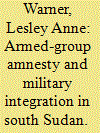

|
|
|
|
|
| Publication |
2013.
|
| Summary/Abstract |
Since the signing of the Comprehensive Peace Agreement in 2005, the government of South Sudan has sought to neutralise the threat that armed groups pose to stability through their integration into the Sudan People's Liberation Army (SPLA), rather than coercion. Although successful in part, this approach has nevertheless led to the continued proliferation of armed groups. In this article, Lesley Anne Warner analyses how the government of South Sudan and the SPLA have administered the amnesty and integration process, concluding that military integration is a process that is managed, but not yet fully mastered.
|
|
|
|
|
|
|
|
|
|
|
|
|
|
|
|
| 2 |
ID:
186337


|
|
|
|
|
| Summary/Abstract |
“Ending impunity” is often heralded as the key mechanism for stopping rape in war. Yet, little systematic evidence or analyses exist of the relationship between impunity (or lack thereof) and sexual violence. We argue that amnesties signal impunity and permissiveness for sexual violence, which can perpetuate and instigate more sexual violence by rebels. Trials, on the other hand, signal a nonzero probability of punishment, which could have a deterrent effect. Studying all intrastate armed conflicts in the period 1989–2011, we find in line with the impunity signal that amnesties are associated with sexual violence by rebels, but we are not able to demonstrate a deterrent effect of trials. While the study prevents us from conclusively saying that ending impunity would be an effective policy tool to stop sexual violence in war, the association between amnesties and subsequent sexual violence is a testament to the perils of impunity.
|
|
|
|
|
|
|
|
|
|
|
|
|
|
|
|
| 3 |
ID:
122066


|
|
|
|
|
| Publication |
2012.
|
| Summary/Abstract |
International human rights NGOs utilize soft power resources to shape discourse on state compliance with the Laws of Armed Conflict (LOAC), as well as related policy decisions. The NGO impact is generally due to perceived expertise, credibility and commitment to universal principles. This article examines these factors in the NGO campaign in the UK calling for an arms embargo against Israel. NGO reports and activities created the basis for the July 2009 decision by the British government to cancel five military export licences. However, as shown, these reports contain problematic methodologies, inaccurate claims, and controversial interpretations of international law.
|
|
|
|
|
|
|
|
|
|
|
|
|
|
|
|
| 4 |
ID:
104058
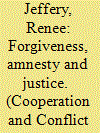

|
|
|
|
|
| Publication |
2011.
|
| Summary/Abstract |
The practice of forgiveness in processes of conflict resolution and post-conflict justice is confronted by two sets of serious criticisms. First, scholars and practitioners alike have questioned whether or not the fundamentally interpersonal practice of forgiveness can be readily and legitimately transposed to broader socio-political contexts. Second, questions have also been raised concerning the potential for forgiveness, particularly when associated with amnesties, to jeopardize and even circumvent the application of justice in post-conflict contexts. By contrast, supporters argue that forgiveness is not only possible but necessary in politics and, by drawing a distinction between amnesties and forgiveness, and restorative and retributive forms of justice, that forgiveness contributes to the achievement of restorative justice. By analysing the role that forgiveness is playing in bringing almost two decades of conflict between the Lord's Resistance Army and the Ugandan government to an end, this article demonstrates that a disjuncture exists between the theoretical treatment of forgiveness and the practice of political forgiveness. That is, it demonstrates, contrary to arguments made by both its supporters and critics, that political forgiveness, even when conceived in conjunction with amnesties, may contribute to both restorative and retributive forms of justice.
|
|
|
|
|
|
|
|
|
|
|
|
|
|
|
|
| 5 |
ID:
123283


|
|
|
|
|
| Publication |
2013.
|
| Summary/Abstract |
The amnesty programme initiated by the Yar'Adua/Jonathan administration to placate militants in the oil-rich Niger Delta region, though reactive - like previous governments' strategies - has ensured relative peace in the region thereby bringing oil production to its maximum level thus far. But painfully this has not translated to a better life for the vast majority of those living in the Niger Delta who are not included in the amnesty programme. In this study, based on descriptive analysis, we aim to demonstrate: (i) the futility of the previous government's strong-arm measures in the management of the Niger Delta crisis and how this led inadvertently to the evolution and radicalization of militant groups that needed to be placated in order to curtail their heightened disruptive activities; and (ii) the amnesty programme adopted for this purpose is a short term expediency that could not address the myriad problems confronting the Niger Delta comprehensively. This implies that more broad-based programmes, targeted at the rapid development of the area, creation of job opportunities, environmental restoration and robust support for sustainable socio-economic endeavours geared towards self-reliance, would have to be proposed in order to ensure lasting peace in the region.
|
|
|
|
|
|
|
|
|
|
|
|
|
|
|
|
| 6 |
ID:
139443
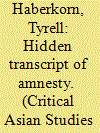

|
|
|
|
|
| Summary/Abstract |
There were two, not one, amnesty laws passed in relation to the 6 October 1976 massacre at Thammasat University and coup in Thailand. The first amnesty law, passed on 24 December 1976, legalized the coup and prevented those who created the conditions for the coup and seized power on the evening of 6 October from being held to account. The second amnesty law, passed on 16 September 1978, freed eighteen student activists still undergoing criminal prosecution and dismissed the charges against them. Although neither amnesty mentioned the massacre, the urgency of producing and then safeguarding impunity for the state and para-state actors behind the violence at Thammasat was the absent presence in both laws. Combining a close reading of both laws with examination of archival documents about the drafting of the first amnesty law and court and other records related to the second, this article uncovers the hidden transcripts of both amnesty laws as a point of departure for examining questions about impunity, law, and history. First, what are the legal mechanics through which violent actors escape accountability? Second, what are the legal and political functions of amnesty when no crime has been committed? Third and finally, might accountability for past violence be possible, and if so, under what conditions? The answers to these questions illuminate how impunity was produced in the specific case of the 6 October 1976 massacre in Thailand as well as address broader concerns about impunity's role in state formation.
|
|
|
|
|
|
|
|
|
|
|
|
|
|
|
|
| 7 |
ID:
175333
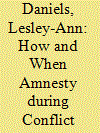

|
|
|
|
|
| Summary/Abstract |
n the difficult process of ending civil wars, granting amnesty during conflict is seen as a useful option, with an underpinning assumption that trading justice for peace is effective. However, is the case? This article tries to bring some clarity to when and how amnesty given during conflict has an impact. Amnesty should have different effects on diverse conflict endings: negotiated settlement, rebel victory, government victory, or conflict reduction. The article also disaggregates amnesties to test direct impacts as an incentive or through reducing the commitment problem, and indirect effects that give military advantage to the government. Using a cross-national data set of amnesties in dyadic conflicts from 1975 to 2011, the research finds that amnesty’s strongest effect is, surprisingly, not as an incentive but rather to reduce commitment problems. It can lead to negotiated settlements but also to government military advantage. The results have implications for negotiations and conflict resolution.
|
|
|
|
|
|
|
|
|
|
|
|
|
|
|
|
| 8 |
ID:
057782
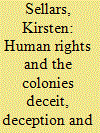

|
|
|
| 9 |
ID:
148780


|
|
|
|
|
| Summary/Abstract |
The granting of amnesties has now become a cornerstone of peacebuilding efforts in societies emerging from conflict. Yet, the impact of the role of religion and ethnicity in determining attitudes towards such arrangements has not been empirically assessed. Mindful of this omission, this article investigates the relationship between a range of religious measures — religious practices and beliefs in and about God — and ethnonationalist identity on public attitudes toward amnesty in Northern Ireland. Based on nationally representative survey data, the results suggest that, although Protestants are significantly more opposed to such an initiative than Catholics, both religious beliefs and ethnonational identity are significant, albeit divergent, net predictors with respect to their differing views.
|
|
|
|
|
|
|
|
|
|
|
|
|
|
|
|
| 10 |
ID:
184490
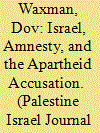

|
|
|
|
|
| Summary/Abstract |
For many people, the term “apartheid” immediately brings to mind the segregation, discrimination, and repression of black South Africans during the decades of white minority rule there. In fact, the word itself means “apartness” in Afrikaans, and it was first used by the ruling party in South Africa in 1948 to describe the racial laws and regulations it imposed, purportedly to preserve the purity and primacy of the country’s white population. As the long struggle of black South Africans for equality and democracy gradually gained support around the world, the anti-apartheid movement emerged, and with its incessant calls to boycott, divest from, and sanction South Africa, it gradually turned the country into an international pariah, eventually helping to end apartheid in South Africa and establish a multiracial democracy there. It is this history that the term “apartheid” evokes, and it is what gives the word its emotional power.
|
|
|
|
|
|
|
|
|
|
|
|
|
|
|
|
| 11 |
ID:
157904
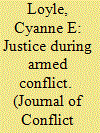

|
|
|
|
|
| Summary/Abstract |
While armed conflict is ultimately about violent interaction between combatant groups, a variety of policies are pursued in conjunction with violence that contribute to the course of conflict and its outcomes. One underdeveloped area of research is the use of judicial and quasi-judicial processes during armed conflict. These processes, including trials, truth commissions, reparations, amnesties, purges, or exiles, are directly related to the actions and abuses of the conflict itself—a phenomenon we refer to as during-conflict justice (DCJ). To enable researchers to answer questions about when and why governments and rebels resort to these strategies, and to what effect, we created a global, cross-national dataset which includes 2,205 justice processes implemented during 204 internal armed conflicts between 1946 and 2011. Using these data, this article investigates the conditions under which governments and rebels employ DCJ as well as the potential effects of DCJ usage on conflict dynamics and outcomes.
|
|
|
|
|
|
|
|
|
|
|
|
|
|
|
|
| 12 |
ID:
114087
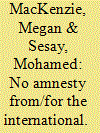

|
|
|
|
|
| Publication |
2012.
|
| Summary/Abstract |
The literature on norms is dominated by debates over the definition of norms, discussion of the evolution of norms, norm diffusion, or norm implementation, and accounts of positive features associated with norms such as cooperation, mutual understanding. This paper argues that "the story" of international norms-or the dominant account of norms-is primarily a white, Western version that assumes that norms emerge from equal exchanges and relationship between states, denying the marked economic and political inequality between global actors and largely disregarding the intense contestations and controls associated with norms. In turn, this paper is an attempt to examine the tensions between so-called international norms and "local" norms and practices as well as the power dynamics and economic constraints that influence so-called global norms. Keeping in mind these tensions between the "story" of international norms and the practical constraints for local actors in the global south, this paper includes uses of the case study of Sierra Leone to examine what happens when "international" norms, such as those associated with transitional justice conflict with "local" norms. Specifically, the local norm of amnesty within Sierra Leone is studied in contrast to the international norm of truth and reconciliation commissions.
|
|
|
|
|
|
|
|
|
|
|
|
|
|
|
|
| 13 |
ID:
124490
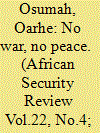

|
|
|
|
|
| Publication |
2013.
|
| Summary/Abstract |
The armed conflict over crude petroleum oil in the Niger Delta has raged for several decades. A host of peace initiatives have been adopted by the Nigerian state to address it, but with minimal impact. The amnesty offer to repentant militias in 2009 by President Umaru Yar'Adua's administration is one of the most recent and broadest peace initiatives by the Nigerian government intended to end the general tendency to warfare and the absence of peace in the Niger Delta. This article, based on secondary sources of data, examines the components of the amnesty, its critical problems and their implications for peacebuilding in the Niger Delta. It finds that though the programme has engendered relative peace, the issues and grievances that occasioned the general tendency to warfare and absence of peace in the region - such as inequitable distribution of oil revenue, environmental degradation, and underdevelopment - are not properly articulated in the disarmament, demobilisation, and reintegration components of the programme. Thus, it holds that the prevailing situation in the region largely approximates a swinging pendulum of no war, no peace.
|
|
|
|
|
|
|
|
|
|
|
|
|
|
|
|
| 14 |
ID:
027448
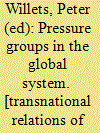

|
|
|
|
|
| Publication |
London, France Pinter (publishers), 1982.
|
| Description |
xv, 225p.
|
| Series |
Global politics series
|
| Standard Number |
0903804867
|
|
|
|
|
|
|
|
|
|
|
|
Copies: C:1/I:0,R:0,Q:0
Circulation
| Accession# | Call# | Current Location | Status | Policy | Location |
| 020906 | 327.1/WIL 020906 | Main | On Shelf | General | |
|
|
|
|
| 15 |
ID:
140115
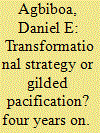

|
|
|
|
|
| Summary/Abstract |
My central aim in this paper is to evaluate the outcomes of the amnesty programme established in mid-2009 by the Nigerian government as a way of resolving the groundswell of violence in the oil-rich Niger Delta region. In particular, I focus analytic attention on the planning and implementation of the Disarmament, Demobilisation and Reintegration (DDR) process of the amnesty. I argue that while the amnesty promotes non-killing alternatives to conflict resolution and opens a door for stabilisation, its current planning and implementation is flawed and unable to reduce the long-term potential for armed conflict in the Niger Delta. Far from been a transformational strategy, I argue that the amnesty programme has become a strategy of gilded pacification essentially targeted at buying off militants and re-establishing oil and gas production in the Niger Delta without addressing the multilayered causes of peacelessness in the region.
|
|
|
|
|
|
|
|
|
|
|
|
|
|
|
|
| 16 |
ID:
123268
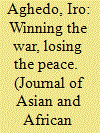

|
|
|
|
|
| Publication |
2013.
|
| Summary/Abstract |
The amnesty granted to the Niger Delta militants by the Nigerian state has stopped active and sustained physical combat in the oil-rich but volatile region. Yet, peace remains elusive in the area. This article, which relies essentially on secondary sources of data, examines this 'no war, no peace' situation by mapping the challenges confronting the amnesty programme and its corollary disarmament, demobilization and reintegration (DDR) programmes. It is argued that, until the incentives for violence are identified and checked, the age-long grievances of the region against environmental insecurity, underdevelopment, and distributional injustice in oil rents addressed, perpetrators of human rights violations - including extra-judicial murders - brought to book, and victims of human rights abuses and the protracted conflict compensated, the current peace of the graveyard in the region is likely to subsist.
|
|
|
|
|
|
|
|
|
|
|
|
|
|
|
|
|
|
|
|
|